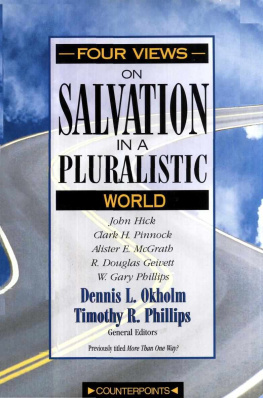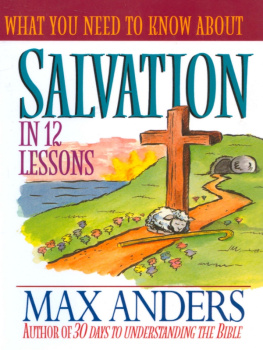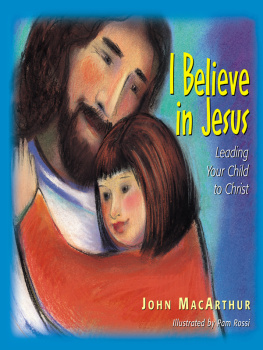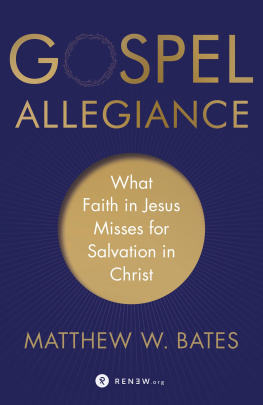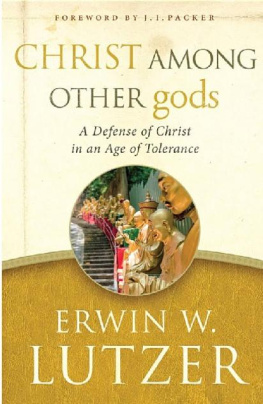Four Views on Salvation in a Pluralistic World
John Hick
Clark H. Pinnock
Alister E. McGrath
R. Douglas Geivett
W. Gary Phillips
Stanley N. Gundry series editor
Dennis L. Okholm general editor
Timothy R. Phillips general editor

Table of Contents
Dennis L. Okholm and Timothy R. Phillips
THE CHALLENGE OF RELIGIOUS PLURALISM
Susan had just returned to campus after a semester of social work in Nigeria. How could anyone believe that the Yoruba are not saved? she blurted out in her Christian theology course. They are more giving and caring than I!
Dr. Smith, an American college professor, spends a summer teaching Christians in Muslim-dominated Sudan and wonders how God could so arrange a world that he, the professor, has the advantage of growing up in a Christian-dominated culture where the gospel is readily heard, whereas thousands of Muslims in Sudan never hear the gospel. Is it all a matter of historical accident or of some mysterious divine providence?
Every summer hundreds of Chicago restaurants pitch their tents in Grant Park to host a smorgasbord of culinary delightsfrom the everyday to the exotic. The curious and the hungry can sample the feast without guilt or commitment. The recent World Parliament on Religions in the same windy city offered a similar Taste of Chicago for religion. And increasingly, major cities across America offer festivals of diverse religions and spiritualities that highlight our pluralistic culture in a splay of booths.
Are the moral adherents to the African traditional religions, virtuous Hindus, and Buddhists really outside a salvific relationship to God? Do Muslims and Jewswho know the God of Abraham and follow his commandsneed to hear the gospel? No other issue is so defining of the contemporary religious landscape.
This haunting question is not new. Christianity was born in a religiously pluralistic world. But throughout its history the church has proclaimed that Jesus Christ is the only Savior and that salvation is found only in communion with him, specifically in the church. The point is not simply that Christ is sui generis , for here alone God assumed flesh and lived among us, but that his salvific benefits require personal communion with him. As a result, Cyprians famous dictum, extra ecclesiam nulla salus , found wide acceptance throughout church history in both Catholic and Protestant circles, even though the focus shifted to the church as the instrument of the gospel. Consequently, Christian leaders have perceived their religious competition to be in need of conversion to Jesus Christ, despite knowing many truths regarding God. In fact, this vision has propelled Christian missions in a variety of forms from St. Paul to Gregory the Great, from Francis Xavier to Philippe de Corguilleray, from William Carey to Jim Elliot.
Christianitys historical particularity was confronted with the question of fairness and justice during the Enlightenment: How could a loving God fail to offer salvation to all? Friedrich Schleiermacher in the early nineteenth century sought to answer this question by applying his innovative theological methodcorrelating Christianity as the fulfillment of public truthsto the problem of religious diversity. God, Schleiermacher argued, is salvifically available in some degree in all religions, but the gospel of Jesus Christ is the fulfillment and highest manifestation of this universal religious awareness. Classically, liberal Christianity has held that Gods immanent and saving revelation is available to all ages and cultures but exemplified in the final degree in Jesus Christ. That is, Christianity is the all-inclusive and final religion.
By the late nineteenth century, historicism, with its heightened awareness of cultural and religious relativities, challenged the inclusivists normative claim that Jesus Christ is the fulfillment of religion. As Ernst Troeltsch provocatively argued, since we are at every moment purely historical creatures, religious claims can only be viewed as our culturally conditioned apprehension of the divine. Unable to make normative religious judgments, Troeltsch espoused pluralism. While confessing that Christianity possesses a mighty spiritual power and truth, even a manifestation of the Divine Life itself, he concluded that this judgment has validity for us alone. While Christianity is the currently supreme revelation for Western Europeans, other civilizations have their own independent salvific access to the divine life.
The late twentieth century has heightened the dialogue regarding other religions. While the three views of particularism, inclusivism, and pluralism still have their advocates, Western culture has significantly impacted and narrowed the acceptable alternatives. The distinctive feature of our contemporary world is not Christianitys heralded competition with other religions, but the way Western cultures deal with the reality of religious pluralism. Gandhi expressed the rationale a half century ago. When questioned why he proselytized in the political arena but precluded this among the religions, Gandhi replied, In the realm of the political and social and economic we can be sufficiently certain to convert, but in the realm of religion there is not sufficient certainty to convert anybody, and therefore there can be no conversions in religions.
Simply put, the specter of historicism has corralled religious claims into the private sphere, isolated from political and social discourse. And Western societies demand that everyone assume this relativistic attitude so that each religion must treat the others as if they also have salvific access to God. Popularly we call this political correctness. Everyone is to have an equal voice, especially the marginalized and disenfranchised. That is why the chief virtue in our society is never having to say youre wrong, letting the other have his or her opinion. Religious beliefs amount to little more than matters of personal taste, on a par with ones preference for ice cream or movies.
In this pluralistic politically correct environment, normative religious claims are increasingly difficult to maintain. The recent ebbing of inclusivism in mainline theological circles evidences this. Historicism shattered its attempts to retain the particularity of Christ while affirming the universality of his salvific benefits. Today in mainline circles, Jesus Christ is usually reconstructed as a symbol pointing to Gods universal salvific presence. As one contemporary theologian concludes, Christianity is simply one paradigm of the divine-human relationship among many others, and thus arguments for the absoluteness, superiority or uniqueness of Christianity become difficult if not impossible. That may not be too far off the mark, given the level of political correctness within mainline churches.
But pluralistic ideologies pervade the conservative Christian constituency to no less degree. James Davison Hunters sociological analyses a decade ago documented the inroads that modernitys ethic of civilitywhich seeks to be tolerable to otherswas making in evangelicalism. While this ethic promoted evangelicalisms public legitimacy and a new engagement in the scholarly arena, it also muted such theologically offensive beliefs as Gods judgment on sin, the sole authority of Scripture, and salvation through Christ alone.
Undoubtedly Western culture has dramatically affected evangelical distinctives. Long known for its evangelistic zeal, the number of missionaries supported by North American agencies in the 1990s has begun declining for the first time since the 1940s. Foreshadowing this reversal for more than a decade, monetary contributions have not matched inflation. The apparent reason is not difficult to discern: The new willingness to subject revelation to contemporary sensibilities has eroded the theological underpinnings for a missionary faith. Hunters questionnaire found that only two-thirds of the students in evangelical colleges believe that the sole hope for heaven is through a personal faith in Jesus Christ. Increasingly students in Christian colleges are affronted when hearing the traditional claim that salvation is found in Jesus Christ alone.

